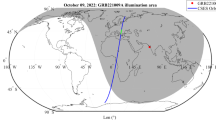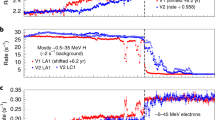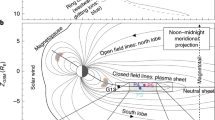Abstract
S. E. FORBUSH1 has noted a systematic decrease of cosmic ray ionization at Cheltenham, U.S.A., and Huancayo, Peru, simultaneous with a decrease of the earth's horizontal magnetic force (H.F.), during magnetic storms of April 1937. V. F. Hess and A. Demmelmair2 have confirmed the existence and world-wide character of the cosmic ray decrease by observations on the Hafelekar near Innsbruck. They agree with Forbush in concluding that the study of these cosmic ray changes during magnetic storms will give valuable information on the spectrum of the cosmic radiation.
This is a preview of subscription content, access via your institution
Access options
Subscribe to this journal
Receive 51 print issues and online access
$199.00 per year
only $3.90 per issue
Buy this article
- Purchase on Springer Link
- Instant access to full article PDF
Prices may be subject to local taxes which are calculated during checkout
Similar content being viewed by others
References
Phys. Rev., 51, 1108 (1937).
NATURE, 140, 316 (1937).
Terr. Mag., 37, 269 (1932).
Terr. Mag., 40, 349 (1935).
Terr. Mag., 36, 77–97, 171–180 (1931); 37, 147–156, 421–429 (1932); 38, 79–96 (1933).
Arch. Sci. Phys., 32, 277 (1911).
Author information
Authors and Affiliations
Rights and permissions
About this article
Cite this article
CHAPMAN, S. Cosmic Rays and Magnetic Storms. Nature 140, 423–424 (1937). https://doi.org/10.1038/140423b0
Issue Date:
DOI: https://doi.org/10.1038/140423b0
This article is cited by
-
Cosmic ray and geomagnetic disturbances from July 1957 to July 1958
Il Nuovo Cimento (1960)
-
Daily total cosmic ray indices at Huancayo and world geomagnetic indices and magnetic storms
Acta Physica Academiae Scientiarum Hungaricae (1955)
-
Zum Verhalten der kosmischen Ultrastrahlung bei magnetischen St�rmen
Die Naturwissenschaften (1954)
-
Cosmic Rays and the Aurora of January 25-26
Nature (1938)
Comments
By submitting a comment you agree to abide by our Terms and Community Guidelines. If you find something abusive or that does not comply with our terms or guidelines please flag it as inappropriate.



